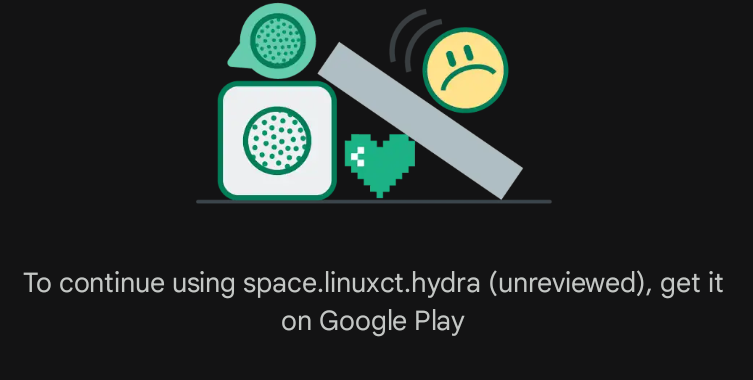You might sideload an Android app, or manually install its APK package, if you’re using a custom version of Android that doesn’t include Google’s Play Store. Alternately, the app might be experimental, under development, or perhaps no longer maintained and offered by its developer. Until now, the existence of sideload-ready APKs on the web was something that seemed to be tolerated, if warned against, by Google.
This quiet standstill is being shaken up by a new feature in Google’s Play Integrity API. As reported by Android Authority, developer tools to push “remediation” dialogs during sideloading debuted at Google’s I/O conference in May, have begun showing up on users’ phones. Sideloaders of apps from the British shop Tesco, fandom app BeyBlade X, and ChatGPT have reported “Get this app from Play” prompts, which cannot be worked around. An Android gaming handheld user encountered a similarly worded prompt from Diablo Immortal on their device three months ago.
Google’s Play Integrity API is how apps have previously blocked access when loaded onto phones that are in some way modified from a stock OS with all Google Play integrations intact. Recently, a popular two-factor authentication app blocked access on rooted phones, including the security-minded GrapheneOS. Apps can call the Play Integrity API and get back an “integrity verdict,” relaying if the phone has a “trustworthy” software environment, has Google Play Protect enabled, and passes other software checks.
Graphene has questioned the veracity of Google’s Integrity API and SafetyNet Attestation systems, recommending instead standard Android hardware attestation. Rahman notes that apps do not have to take an all-or-nothing approach to integrity checking. Rather than block installation entirely, apps could call on the API only during sensitive actions, issuing a warning there. But not having a Play Store connection can also deprive developers of metrics, allow for installation on incompatible devices (and resulting bad reviews), and, of course, open the door to paid app piracy.



The fact that an entire generation thinks the only proper way to install software is through an app store is absolutely terrible. Talk about a boon for the gatekeepers, Apple and Google did a bang up job training them to trust no one else.
Schools and universities in principle should be the place where they’re introduced to what really means to own a computer. The trend however seems to give out everyone a locked down e-waste with proprietary restrictions all over the place.
I don’t think you appreciate the real reason for “schooling”
As a long time linux user i find it normal to only install apps through a package manager (essentially the same) but you have a defined API for package sources and can add sources as you like. that would be the best solution. manually installing apps IS risky, and opens the door for malware and incompatible packages, but if you have a trustworthy package source that your packa manager can varify its packages against it gets way better.
A package manager and app-store, which looks very similar from the outside, operates very differently with respect to security and privacy.
Microsoft saw Google and Apple do this with phones, and Steam do this with games, and that’s why they made the Windows store a thing starting with 8.
They wanted to go the same direction.
Put steam with the rest of these parasites ain’t fair… For now